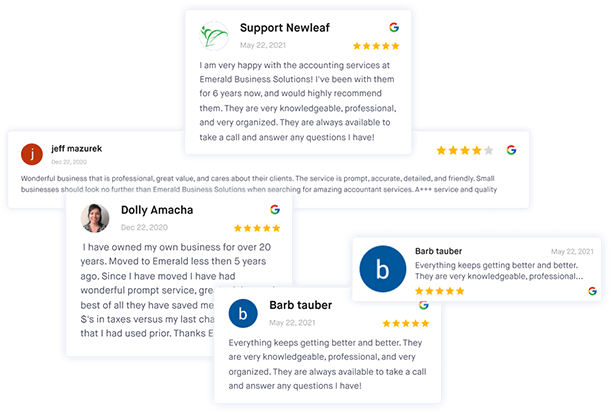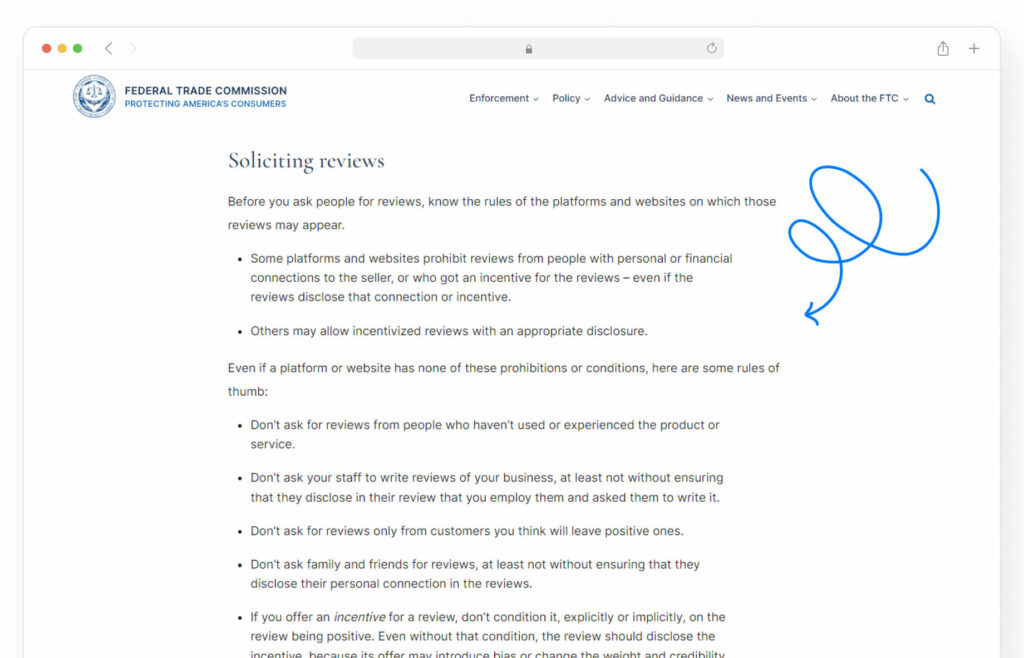If you're running a business, you know the value of customer reviews.
Not only do they help build your business's reputation, but they also influence potential customers in their decision-making process.
It's no wonder that many businesses are tempted to offer incentives to their customers for leaving reviews on Google.
Can you offer Google review incentives to your customers - is it legal? Is it ethical?
Those are both great questions that are worth diving into further.
In this article, we'll explore the world of incentivized reviews and what you should know before offering them to your customers.

Leverage feedback and reviews to improve your online reputation
Get more reviews, build trust, and grow your business with ReviewsOnMyWebsite.
What is exactly is an incentivized review?
An incentivized review is a marketing strategy that businesses use to encourage customers to leave feedback. This strategy involves offering a reward or compensation to customers in exchange for leaving a review of their experience with the business. These rewards can come in many forms, such as discounts, free products, or other incentives.
While incentivized reviews can be an effective way to boost a business's online reputation, they can also be controversial. Some people argue that incentivized reviews can lead to biased or fake feedback, as customers may be more likely to leave a positive review in order to receive the reward.
It's important to note that incentivized reviews are subject to guidelines and regulations from various review platforms and advertising authorities, including Google - which we’ll take a deeper dive into shortly.

Our opinion on the matter? The best way to encourage positive reviews on Google is to provide exceptional products or services and to ask customers to leave a review. This can be done through subtle prompts, such as including a link to the business's Google listing in email signatures or on social media profiles. By focusing on providing value to customers and creating a positive experience, businesses can earn genuine, unbiased reviews that will help to build their reputation and attract new customers.
Is it illegal to incentivize reviews?
No, incentivizing reviews is not illegal. However, it is important to note that it can be considered a deceptive practice, and the Federal Trade Commission (FTC) has issued guidelines for businesses regarding incentivized reviews. The guidelines state that businesses must disclose that they are offering incentives in exchange for reviews, and the reviews must be honest and unbiased. Failure to comply with these guidelines can result in legal issues for the business.

One way to incentivize reviews without violating FTC guidelines is to offer a small reward, such as a discount code, to customers who leave a review, regardless of whether the review is positive or negative. This can encourage customers to leave honest reviews without feeling pressured to leave a positive one.
Another option is to work with a third-party review platform that has its own guidelines and policies for incentivized reviews. These platforms can help ensure that reviews are honest and unbiased, while still providing incentives to customers.
In the end, it is important for businesses to be transparent and honest about their review practices. By following FTC guidelines and encouraging honest reviews, businesses can build a strong reputation and improve customer trust.
Google’s review incentive policy
Google's review policy is an important aspect of maintaining the integrity of online reviews. While some businesses may be tempted to offer incentives in exchange for positive reviews, this practice can ultimately harm both the business and the consumer. One reason why offering incentives for reviews is problematic is that it can lead to biased or dishonest feedback.
If a customer feels pressured to write a positive review in order to receive a discount or other reward, they may not provide an honest assessment of their experience. This can ultimately mislead other potential customers who are relying on reviews to make informed decisions.
Incentivizing reviews can create a sense of distrust between businesses and consumers. If customers feel that a business is trying to manipulate their feedback, they may be less likely to trust that business in the future.
This can ultimately harm the business's reputation. To avoid these issues, it's important for businesses to focus on providing excellent customer service and high-quality products or services. By doing so, they can encourage customers to leave positive reviews organically, without the need for incentives.
Why can incentivized reviews be a tempting marketing strategy?

Incentivized reviews can be a tempting marketing strategy for businesses because they offer a quick and easy way to boost their online reputation. By offering incentives, such as discounts, free products, or other rewards, businesses can encourage customers to leave positive reviews on their website or social media pages.
These reviews can help increase the overall rating of a business, making it more attractive to potential customers who are searching for products or services online. In fact, studies have shown that consumers are more likely to trust and purchase from businesses with higher ratings and more positive reviews.
Additionally, incentivized reviews can be a cost-effective way to generate buzz and increase sales. By offering rewards to customers who leave reviews, businesses can encourage them to share their experiences with friends and family, creating a ripple effect of positive word-of-mouth marketing.
However, there are also risks associated with incentivized reviews. If customers feel that the incentives are not genuine or that they are being coerced into leaving positive reviews, it can damage the trust and credibility of the business. In addition, if the incentivized reviews are discovered, it can lead to negative publicity and a loss of trust from customers.
Therefore, businesses should approach incentivized reviews with caution and ensure that they are transparent and ethical in their approach. They should clearly disclose any incentives offered and encourage customers to leave honest and unbiased reviews, whether positive or negative. By doing so, businesses can reap the benefits of incentivized reviews while maintaining their integrity and reputation in the long-term.
While offering incentives for Google reviews may seem like a great way to boost your business's online presence, it's important to consider the potential risks involved.
Here are three key risks to keep in mind:
1. Loss of credibility
While incentivizing reviews may seem like a good way to get more positive feedback, it can actually backfire by eroding trust in your business. Customers may question the authenticity of your reviews if they suspect that people are only leaving positive feedback because they were offered a reward. This can ultimately harm your reputation and make it harder to attract new customers.
To avoid this risk, it's important to focus on providing excellent customer service and creating a positive experience for everyone who interacts with your business. Encourage customers to leave feedback, but don't offer incentives that could compromise the integrity of your reviews.
2. Legal issues
Incentivized reviews can be considered deceptive practices, which could result in legal issues for your business. The Federal Trade Commission (FTC) has strict guidelines around endorsements and testimonials, and failing to comply with these guidelines could result in fines or other penalties. To avoid legal issues, it's important to be transparent about any incentives you offer for reviews.
Clearly disclose the terms of your incentive program and make sure that customers understand what they're getting in exchange for leaving a review. You may also want to consult with a legal expert to ensure that your program is compliant with FTC guidelines.
3. Google penalties
If Google discovers that a business is offering incentives for reviews, they may penalize the business by removing reviews or even suspending their Google Business Profile listing. This can have a major impact on your online visibility and make it harder for potential customers to find your business.
To avoid Google penalties, it's important to follow Google's guidelines for reviews and avoid any practices that could be seen as manipulative or deceptive. Focus on providing excellent service and encouraging honest feedback from your customers, rather than relying on incentives to boost your online reputation.
What happens if you get caught giving incentives for good reviews?
If a business is caught giving incentives for positive reviews, their reputation can be severely damaged. Customers may lose trust in the business and view their reviews with skepticism. Additionally, the business may face legal issues and penalties from Google or other review platforms.
What to do to get more reviews without incentivizing?
Getting more reviews without offering incentives may require a bit more effort, but it can pay off in the long run. Here are some tips:
- Ask for reviews: Reach out to your customers and ask them to leave a review. Be genuine and polite, and make it easy for them to leave a review by providing a link or instructions.
- Make it easy: Provide clear instructions on how to leave a review, and make the process as simple as possible.
- Offer excellent service: The best way to get positive reviews is to provide excellent service and products. Focus on providing exceptional customer service and delivering on your promises.

Leverage feedback and reviews to improve your online reputation
Get more reviews, build trust, and grow your business with ReviewsOnMyWebsite.
Final Thoughts on Incentivizing Reviews
Offering incentives for Google reviews may seem like a quick way to improve your business's reputation, but it can come at a high cost.
Not only is it against Google's policies, but it can also erode trust and credibility in your business. Instead, focus on providing excellent service and making it easy for customers to leave a review.
With patience and effort, you can build a strong reputation and attract new customers to your business.



